Great Yarmouth school a 'fourth emergency service'
- Published
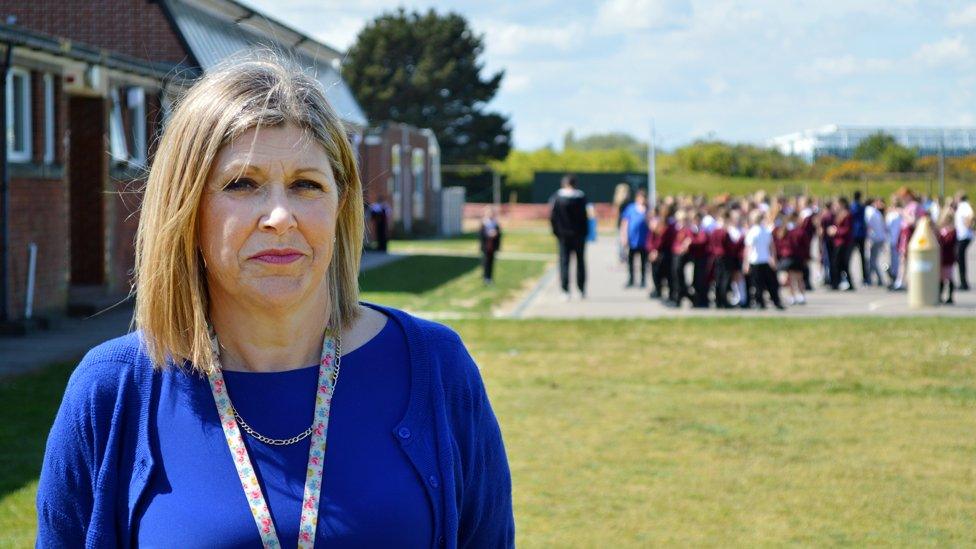
Head teacher Debbie Whiting set up a food bank to support families in poverty
It started with a note. A plea for help, handwritten on a scrap of paper by an 11-year-old pupil. Her mother had run out of food.
For head teacher Debbie Whiting, it was her first real insight into the levels of poverty among pupils at her primary school. Alarmed by the note, she visited the girl's home and found the cupboards bare. Something had to be done, she decided.
And it was. Within a few weeks of that visit Mrs Whiting had set up a food bank at North Denes primary in Great Yarmouth. When this proved invaluable to struggling families, the school offered to run a clothes washing service for those of them living in bed and breakfast accommodation. Now the school's librarian has turned hairdresser, cutting the locks of some pupils and de-licing children when required.
The Norfolk school has become, says Mrs Whiting, a "fourth emergency service" for the community that surrounds it.
"When people have got nowhere else to turn, they turn to us," she says. "We've uncovered more and more need. The more you ask, the more you find out - there's a level of hidden poverty that you would not be aware of."
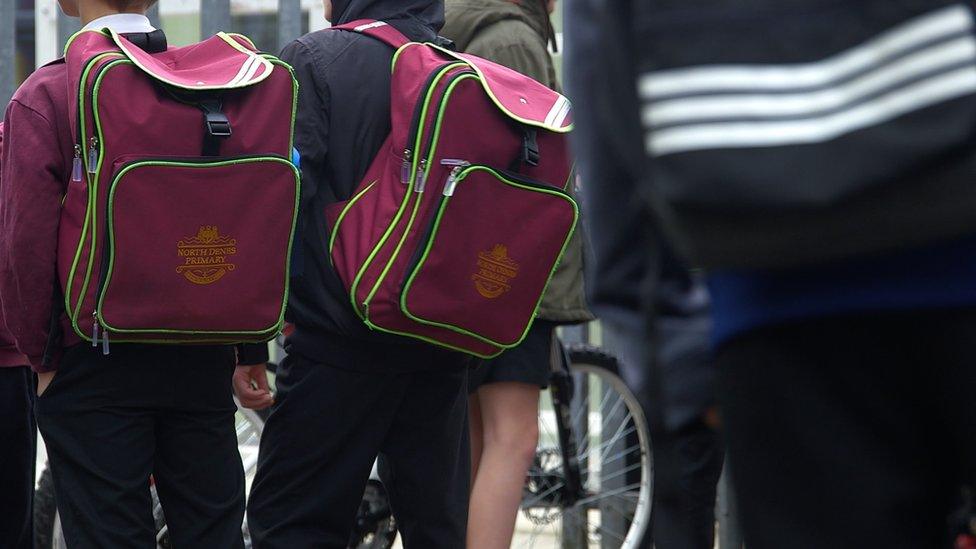
Nearly half the pupils qualify for the pupil premium because of their disadvantaged backgrounds
That visit to the girl's home was in December 2018. Mrs Whiting wanted to discuss the note with her mother, who insisted her daughter should not have said anything because "she had a couple of potatoes the neighbour had given her to eat that night".
Shocked at what she found, Mrs Whiting went shopping for the family. But she realised if one family was struggling in silence there were likely to be others, and discussed starting a food collection with staff.
The food bank began slowly, filled at first with donations from teachers and parents, supplemented by funding raised from community groups. Parents can request an emergency package to see a family of four through a week's worth of meals. Those who feel embarrassed are able to pick up their supplies from a side door, out of sight from other parents.
Mrs Whiting knows the parents struggling to pay their bills, the children fleeing domestic violence, the families at risk of eviction, and those who will today ask her for food to feed their children. She compares them - and the school she leads - to a swan gliding across a lake "but paddling along really hard underneath".
"When you see people in the playground, you wouldn't know who's got food in their cupboard at home and who hasn't. They don't go around carrying a banner."

'I'd be stealing without this school'
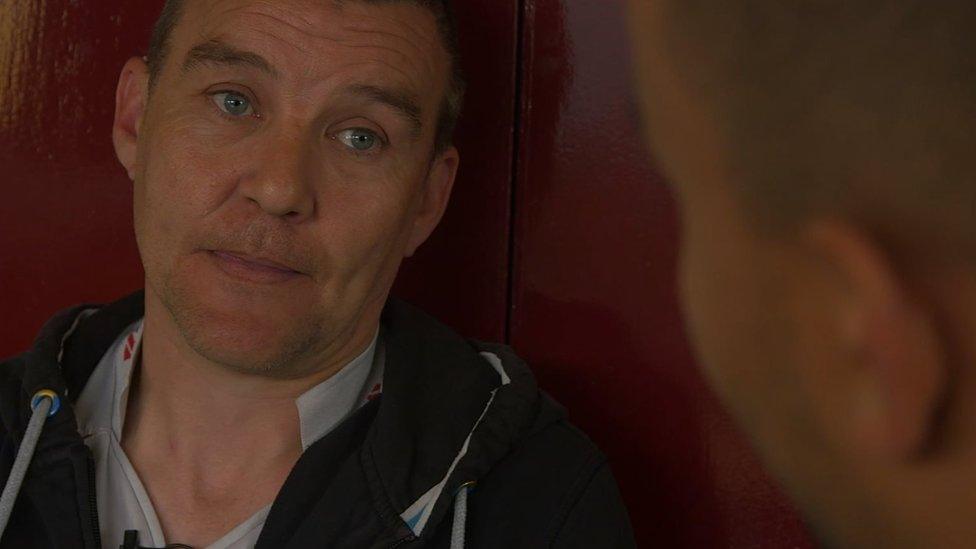
Michael Thrasher says he has gone four days without food so his children can eat
Michael Thrasher is a full-time carer for his disabled partner Paula and 10-year-old son Michael, who has ADHD.
In the past three years the family's monthly income has dropped from about £2,200 a month to £1,600, including rent paid directly to his landlord. But a house move in October stretched finances further, forcing him to ask for help from the food bank at North Denes, where his nine-year-old daughter Tina is a pupil.
At times, he has gone four days without food so that his children can eat. Since December, the family has received four packages from the food bank, each containing seven pre-planned meals for four, and essential toiletries.
"I would have to go out stealing without this school," says Mr Thrasher, 42. "There's no other way you can do it. I am embarrassed to come to the food bank. I would rather not ask for help. I would rather do it all myself but sometimes you can't.
"They think you can live on the money that they give us. We can't."

Just yards from the dunes of Norfolk's east coast, North Denes is a growing 370-pupil school serving one of the most deprived boroughs in the UK. Nearly half of the school's pupils are eligible for the pupil premium, a financial top-up for those from disadvantaged backgrounds.
At its site on the northern fringes of the town, behind a derelict pub and beside a caravan park, the challenges facing modern coastal communities are being played out. Like many seaside towns, Great Yarmouth has suffered from the loss of jobs in traditional industries, which have been replaced with seasonal, insecure work in sectors such as tourism and food production.
In the government's most recent Index of Multiple Deprivation, a quarter of Great Yarmouth's 61 neighbourhoods were among the most deprived 10% in the UK. Across the borough, earnings, life expectancy, GCSE results, and major health measures are worse than the national average.
Debbie Whiting: "When people have got nowhere else to turn, they turn to us"
Three years ago, Great Yarmouth was chosen as a pilot site for the introduction of universal credit - a welfare reform which combines six benefits into a monthly payment. But the scheme has been dogged by delayed payments, which take five weeks and are paid in arrears, and many families have seen payments cut.
And the school has seen the effects.
"We have had parents who have found it difficult to manage financially and to feed their children because of the introduction of universal credit," says Mrs Whiting. "It's caused huge problems."
When the food bank opened, the Department for Work and Pensions said the reasons for food poverty were "complex", pointing out that 100% advances had been available since the programme's introduction. It denied universal credit was linked to food bank use and that "significant improvements" had been made so people could be paid sooner.

Coastal Britain
These stories are part of special coverage across BBC News looking at the challenges and opportunities in Britain's coastal towns.

At the school gates, mother-of-four Sandy Lysaght says the food bank and its staff have been an "amazing" support.
"Just chatting to them makes you feel that it's not your fault," she says.
About half a dozen families a week use the service, but many others donate when they can. Yet the problems of poverty cannot be solved simply by food parcels. One third of children arriving in reception class at North Denes are classed as obese and, by the time they get to year 6, this has risen to half.
"When you have hungry children, how many Mars bars can you get for a £1 and how many apples?" says Mrs Whiting. "It's not that parents don't love their children or don't want better things for them, but sometimes they don't know how or they haven't got the resources to do it."

Caterer Natalie Creegan runs free cookery classes at the school
The school is midway through its second six-week course teaching parents how to cook nutritious food on a budget. Caterer Natalie Creegan's free sessions have proved so popular some parents have asked to stay on to teach others.
"At the first session, only one of the parents had ever chopped an onion, so we are starting fairly basic," she says. "But the skill set now is much better."
The classes also underline the solidarity among parents. On the day the BBC visited, a class whip-round had raised £10 for a couple whose electricity meter had run out.
Cutting deep
If money is hard to come by for the parents, times are equally tough for the school. Its funding per pupil has this year dropped from about £3,100 to £2,700 per head, according to the head teacher.
Its budget for the year starting in April 2019 is based on a snapshot of its pupil roll at the start of October 2018, meaning the 19 pupils who have joined since must be funded from their classmates' pot.
Pension contributions have increased by 8%, the minimum wage for the lowest-paid workers has risen and the cost of external services has gone up too. That has left a £130,000 gap in the 2019-20 budget, which would have grown to £350,000 by 2021-22 without drastic action.
The Department for Education would not comment on North Denes' funding situation but said Great Yarmouth schools on average had seen an increase of 2.1% compared to 2017-18 funding levels.
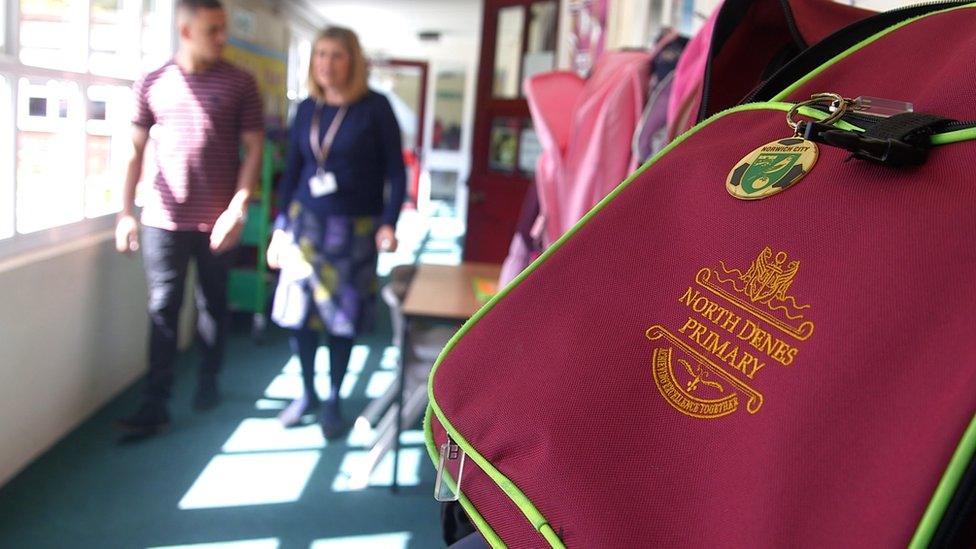
Jobs must be cut at the school to balance the books, says the head
To balance the books, one teaching and five classroom assistants roles will be cut. Contracts for other specialist and support staff will not be renewed. In total, 13 people will not return to the school when the new term starts in September - about a quarter of the staff.
Mrs Whiting says it is "upsetting", but she has no choice. Staff have discussed cutting their hours together, so that fewer redundancies are needed, but financial pressures weigh on them too.
Debbie Gleeson: school librarian, occasional hairdresser to pupils and one of the staff at risk, is also a single parent. She admits she is scared.
"It means going back on benefits, on universal credit. Am I going to end up being one of those that's going to rely on the food bank?"
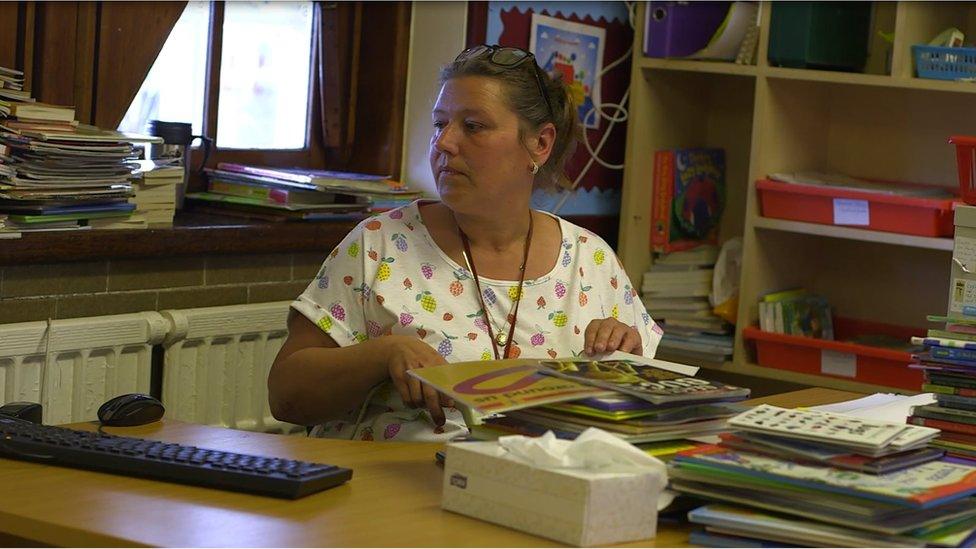
Debbie Gleeson works in the school library and cuts the hair of children but has been told her job is at risk
The staff at North Denes know they do not have to provide the extra support they do. They know the impact if they don't, however. Children who are not fed, warm or safe do not learn well, can behave badly or miss school.
"All these things, they are all part of enabling children to be in a place where they can learn," says Mrs Whiting.
She speaks out to draw attention to the reality of life in school, to highlight the struggles in education that she believes should be a higher priority.
There is optimism at North Denes - it is rated Good by Ofsted, and by next September a new £7m school should be complete behind its current 1930s home. But, says the head teacher, the new buildings would be for nothing without the people and the community inside.
"These are the people who are going to run industry, who are going to work in the health service, in our schools, in our government," she says. "And they only get one go at an education."

- Published14 December 2018
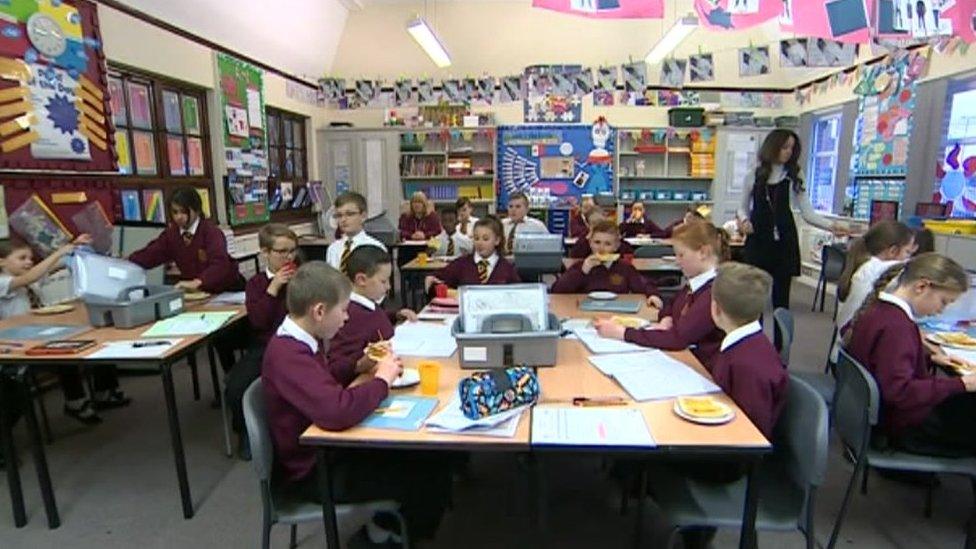
- Published13 May 2024
